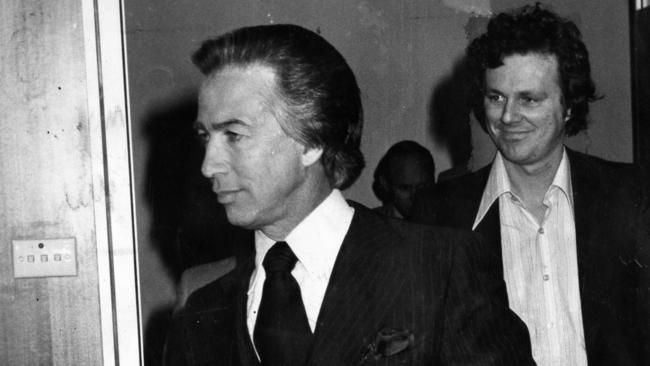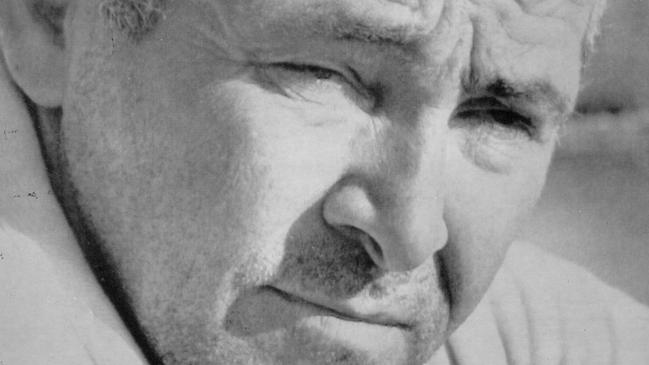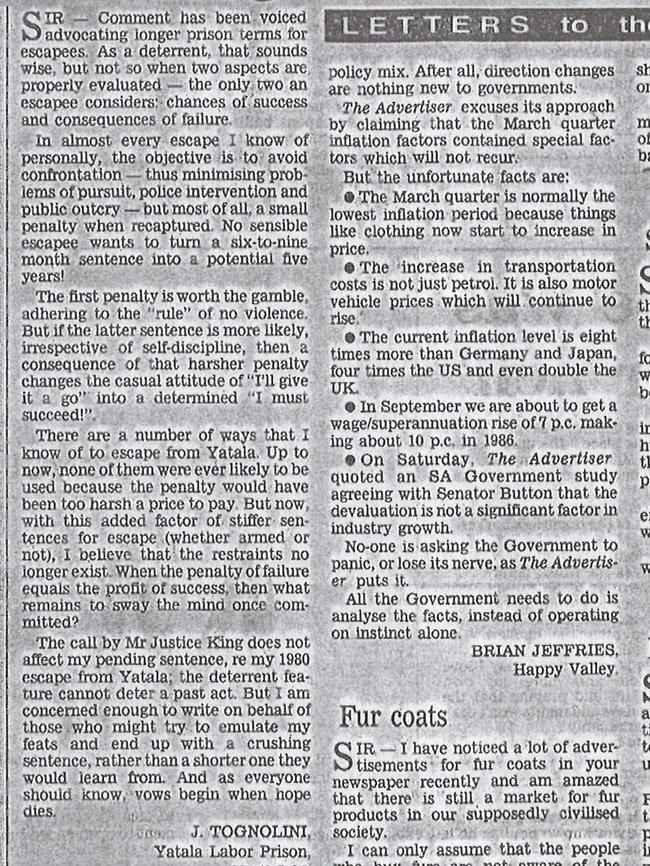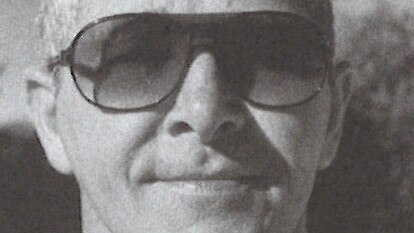Joe Tognolini, the master escape artist, safecracker and philosopher speaks about Don Dunstan, giving advice to young crims
THE inmates probably expected another bleeding heart, exhorting them to repent their sins and choose life in the straight lane. But that's never been Joe Tognolini's style.
THE inmates probably expected another bleeding heart, exhorting them to repent their sins and choose life in the straight lane.
But the speaker is Joe Tognolini, and there will be no sermon of admonition this day.
“I’d tell them: If you’re into crime, continue. Love it. Enjoy it. Do it,” the former safebreaker says.
“But you’ve got to pay the price. Don’t complain when you’re back in here.”
Now approaching his mid-70s and several decades past his last stint in the Australian penal system, Joe retains strong views on punishment and rehabilitation.
A free man since the 1980s, Joe holds an enduring admiration for former South Australian Premier Don Dunstan.
One of the great political reformists, Dunstan implemented liberal ideals of rehabilitation and retraining rather than hard-labour and mindless punishment for inmates during the 1970s.
“Don Dunstan, you see, his ideas were so advanced compared to everything else that was going on around Australia, if you follow it and compare it to other prisons,” Joe says.

DUNSTAN: A MAN AHEAD OF HIS TIME
During the Dunstan era and the 1980s, prisoners could win significant reductions on their jail time through good behaviour inside.
But so-called “Truth In Sentencing” laws introduced in the early-1990s removed such incentives and laws have continually toughened, including reforms that ensured many violent offenders serve at least four-fifths of their head sentence.
Joe says anyone who believes governments of today are “soft on crime” need only look at SA murder terms.
Under SA law, anyone convicted of murder incurs a mandatory head sentence of life, with a non-parole period of at least 20 years, unless the court finds “special reasons” such as co-operation with authorities.
“When I was over here (SA in the 1970s and 80s) a life sentence meant probably not more than seven to 10 years,” he says.

LETTERS TO THE EDITOR
Five prison escapes and five times shot, Joe and two accomplices pulled off one of Australia’s most remarkable prison breaks from Yatala in June 1980.
A Royal Commission followed the escape, in which two unknown men broke into Yatala, used an oxyacetaline welding kit to cut the bars from Joe’s third-floor cell before making their way back out again.
He was caught six months later in Far North Queensland, and wrote an eloquent letter from his renewed surroundings at Yatala in 1981, as politicians and departmental chiefs sweated through a Royal Commission into SA prisons, largely prompted by his fifth and final escape.
The letter rebutted the argument for increased penalties for inmates who broke out of prison, and was published in The Advertiser as he served the remainder of his escape-interrupted sentence.

MOST INMATES ARE NOT MONSTERS
As a younger man, Joe served time at Melbourne’s Pentridge Prison with death row inmates such as the last man hanged in Australia, Ronald Ryan.
Joe recalls some of the condemned men having their death sentences commuted, but replaced with head sentences of 50 or even 60 years.
“Those sentences were ridiculous because with life you get out on parole, but those sentences of say 50 years, you had to serve that time,” he says.
Despite serving just over 12 years inside prisons for crimes that would nowadays attract far heftier stints, Joe says he believes he was lucky the prevailing attitude of his time was that everyone deserved another chance after paying their debt to society.
“My view is that if you come out no worse than you went in, then the system has worked,” he says simply.
“But if you come out worse than you went in, and I’ve seen it, then it hasn’t worked.
“I’ve seen people come out and murder the next day, they are so full of anger and whatever is inside them that got them there.”
There are some, Joe says, who deserve to be locked up for good, such is their volatility and genuine disdain for others.
But they are the vast minority, and Joe believes jail houses many extremely capable men and women who, with guidance, could succeed and contribute to wider society after release.

TOUGH LAWS AND UNORTHODOX TALKS TO PRISONERS
Still sporting sleeve tattoos that adorned his arms decades before they came into fashion — he had five tattoos at age 13 — Joe is at peace with his lot in life, but would still pack a mean punch.
He reckons the odd dash of “street justice” could deter some from their errant ways, but says he is frustrated when politicians merely increase the penalties for crimes.
“The moment they can’t find something all they do is make the punishment greater,” he says.
Joe is particularly annoyed that sex offenders and those who terrorise the innocent are not punished as harshly as crimes against property or the government.
After finally repaying his debts to society by the end of the 1980s, Joe spent a brief period imparting his unorthodox wisdom to younger Victorian inmates.
“I didn’t ask what their crimes are, I’m really not interested. And I just say ‘whatever you’ve done I’ve basically done it’,” he explains.
“There’s plenty I’ve got away with, same as you guys, and there’s plenty I haven’t.”
But Joe’s jailhouse chats were far from judgmental.
He told the younger mob to back themselves in if crime was their calling, but to accept the likely consequence of a life away from friends, freedom and family.
Joe says he’s unsure how much impact his talks had, but received a number of letters over the years from inmates, some of whom had abandoned crime as a lifestyle.
“Who knows what it did? But I was okay with what I did because no way was I telling them that they’re on the wrong track or doing wrong,” he says.
“All I was saying was broaden your horizons and broaden your choices, and if you’re in a negative, try and turn that into a positive because gee that has turned my life around a few times.”
The bottom line for Joe as he approaches old age is that crime is a young man’s game, and the years lost inside prison can never be recouped.
“It’s better to be on the street hungry than in there fed,” he states simply.
